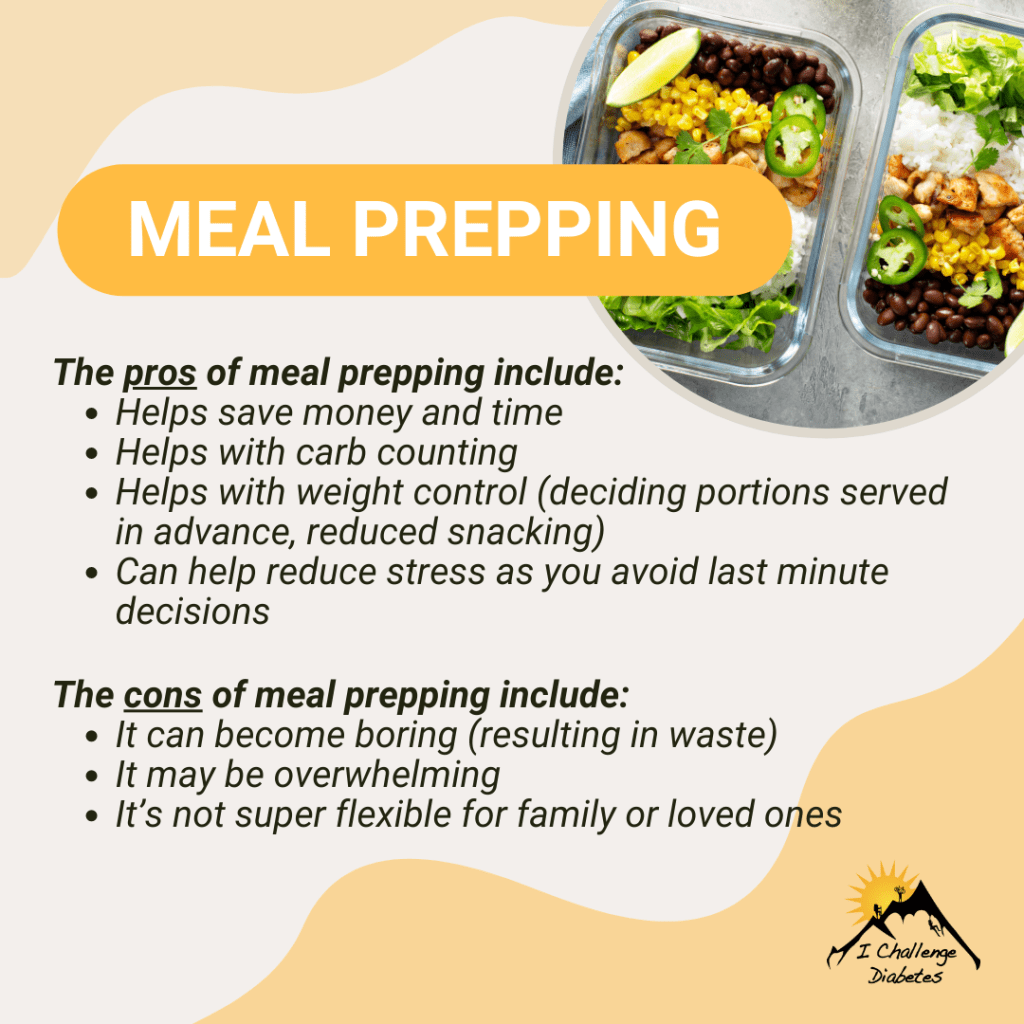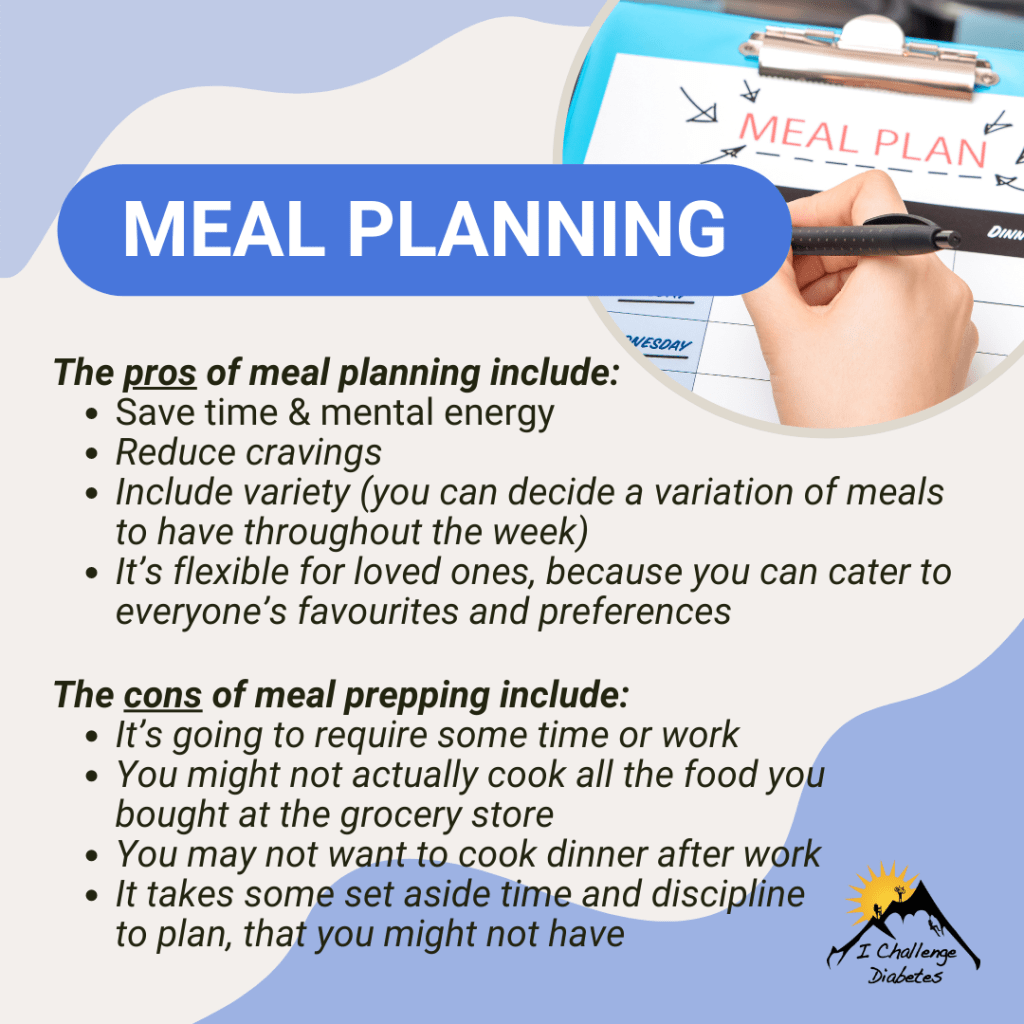Meal prepping has become a lot more popular over the years as an efficient way of ensuring that we have healthy meals available to us. And while this is an effective way of guaranteeing good food, it can sometimes take up a lot of time in one day if you want to prepare ALL of your meals. You take away the work of cooking every night away, but you compromise that with then eating the same thing, in the same amount at every meal.
Here are 2 different ways we can plan our meals in advance, both of which can keep us accountable to good nutritional habits simply by being more proactive about how we approach our meals, rather than reactive.
We can meal PREP – Meal prepping involves both planning & preparing your meals in advance, whether that’s all of them, some of them, or just a handful.

The pros of meal prepping include:
- Helping save money. You’ll know exactly what food you need and in what quantities.
- Save timing. Yes you may spend a couple hours prepping meals, but ultimately that is time you wont need to spend throughout the week.
- It can absolutely help with weight control, as you decide the ingredients and portions served in advance.
- Reduce snacking. You don’t need to grab that candy bar or any kind of snacks anymore because now you have your own snack, your own lunch, and your own dinner. So with everything well prepared, you can significantly reduce snacking or mindless eating.
- Can reduce stress as you avoid last minute decisions about what to eat, or rushed preparation.
The cons of meal prepping include:
- It can become quite boring. It’s pretty boring to eat the same dish for several days in a row, especially if it’s something that you don’t LOVE.
- There could be waste. If you can’t eat your prepped meal for whatever the reason, your food will go bad and must be thrown away.
- It may be stressful. You might have good intentions about meal prepping but then only become MORE overwhelmed when you have a full day of cooking ahead.
- It’s not super flexible for family or loved ones. Unless your family wants to eat pre-portioned meals, you’ll end up cooking for them anyways, which means double the time and double the effort. What more, you might end up resenting them when they are eating foods you feel you’re missing out on.
So meal PREPPING is option one. Ultimately, you’re going to have to decide if the pros or cons win out for you and this might involve some trials. In any case, you’re going to have to try things out to see what works best for you. Remember, if you want anything to be a sustainable option for you, it has to feel like it’s HELPING YOU, not HINDERING YOU.
We can meal PLAN – This is different from meal prepping in the sense that you are taking the MENTAL work out of planning everything as it comes, but the PHYSICAL work still comes with each meal.

The pros of meal planning include:
- You will still save money. You’ll know exactly what food you need to get, and your grocery list will reflect this.
- Save mental energy. Sometimes the last thing we want to think about is what we’re cooking later. Knowing in advance takes the guesswork out and gives us clear direction. We don’t have to spend the day negotiating or worse yet, approaching meal time hangry without a plan (because we all know what happens then).
- Reduce cravings. Planning ahead means your head has time to mentally prepare and adapt to what is coming. If you know you have a banana planned for your afternoon snack, you’re less likely to think about how you can fill an “empty void” with mindless snacking.
- Variety – in comparison to meal prepping, you can decide a variation of meals to have throughout the week, because you will be preparing them on the day of.
- It’s flexible for loved ones, because you can cater to everyone’s favorites and preferences.
The cons of meal planning include:
- It’s going to require some day or work. Yes, you’ll know what you’re making, but you’re going to have to make it. Depending on time limitations or stressful schedules, this might be a definite barrier.
- You might not actually cook all the food you bought at the grocery store.
- You might not want to cook dinner after work.
- The recipes you thought would be great, could end up not tasting great.
- It takes some planning and discipline to plan, that you might not have.
The best option I have found both personally and professionally is to combine a bit of both. And honestly, this does require that you commit to at least a few weeks of trying different things to see which you like. New things are going to take time and if they don’t feel completely natural in the beginning, that doesn’t mean they aren’t working – it might just mean they need to be tweaked.
Jennifer Lemke is a fitness and nutrition coach living with type one diabetes. You can find her Beyond Barriers workouts created for ICD at https://ichallengediabetes.org/workouts/








